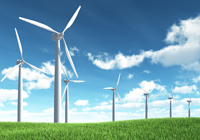Centre for Energy & Power Engineering
 Electrical energy is one of the most important necessities of a modern society. It also forms the fundamental infrastructure upon which the prosperity, progress and stability of a country depends. Without a stable and reliable supply of electricity at affordable prices, it is difficult to visualize how a modern society can function smoothly.
Electrical energy is one of the most important necessities of a modern society. It also forms the fundamental infrastructure upon which the prosperity, progress and stability of a country depends. Without a stable and reliable supply of electricity at affordable prices, it is difficult to visualize how a modern society can function smoothly.
The business structure and the environment under which the utility infrastructure operates have changed dramatically. The impetus for the move is to ensure that the production and transportation of electrical energy will result in even greater economy with a corresponding improvement in the quality of service, due to increased competition in the supply of electricity to customers. The challenge for the industry is to achieve this without compromising the high standard and quality of the supply. The practical effect of de-regulation is also brought into reality by responsible management of the transmission and distribution networks. The party responsible for management of the network can better utilise the power system assets, such as the transmission systems, the distribution generation and renewable resources.
In tandem with the de-regulation move is the growing concern on the impact of electricity generation and transmission-utilisation on the environment. There is a concerted effort to encourage cleaner forms of power generation, and as a consequence the idea of distributed generation has taken birth. One can see much exciting activities in private and non-utility investments in adopting micro-turbines, wind turbines, photo-voltaic and fuel cells, electric vehicles amongst others, as alternatives to the traditional large coal, oil, hydro or nuclear generation. These distributed forms of generation are perceived not only to be much friendlier to the environment but also bring with them some economic advantages. For instance, there is less necessity of transmission networks as the generators can be sited much closer to the loads. However, there are also technical considerations which require deeper investigation. This would include the very interesting problem pertaining to the dynamic interactions between the new generation types and the existing network generators and their impact on the quality of supply. Furthermore there must be methods by which the costs of the distributed generation can be further reduced in order to make this new form of power generation competitive with the traditional methods.